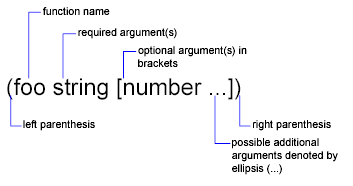AutoLISP Function Syntax
In this guide, the following conventions describe the syntax for AutoLISP functions:

In this example, the foo function has one required argument, string, and one optional argument, number. Additional number arguments can be provided. Frequently, the name of the argument indicates the expected data type. The examples in the following table show both valid and invalid calls to the foo function.
|
Valid and invalid function call examples |
|
|---|---|
|
Valid calls |
Invalid calls |
|
(foo "catch") |
(foo 44 13) |
|
(foo "catch" 22) |
(foo "fi" "foe" 44 13) |
|
(foo "catch" 22 31) |
(foo) |